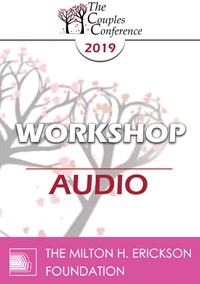CC19 Workshop 15 - Advanced Relational Life Therapy (RLT) - Terry Real, LICSW
Credit Available - See Credits tab below.
Total Credits: 1.5 including 1.5 A.P.A.
- Average Rating:
- Not yet rated
- Topic Areas:
- Workshops | Couples Therapy | Relational Life Therapy Model (RLT)
- Bundle(s):
- CC19 Main Conference Audio Bundle | CC19 Individual Selections
- Categories:
- Couples Conference | Couples Conference 2019 | Online Continuing Education | Pioneers in Couples and Family Therapy
- Faculty:
- Terry Real, LICSW
- Duration:
- 1:10:29
- Format:
- Audio Only
- Original Program Date:
- Apr 14, 2019
- License:
- Never Expires.
Description
Description: This workshop covers phase two of Relational Life Therapy, focusing on Family of Origin and Inner Child Work. It examines how childhood experiences shape each partner’s relational stance and the couple’s dynamic. Key tools include the Relationship Grid, which maps boundaries and self-esteem across four quadrants. The session addresses the impact of patriarchy, grandiosity, and shame, and offers strategies for building healthy self-esteem, managing contempt, and restoring relational balance.
Syllabus Description: This workshop moves beyond the first phase of RLT to detail the theory and technique of phase two: Family Of Origin Work, trauma and Inner Child Work. In phase one we identified each partner’s relational stance and how the two stances combine to produce the couple’s choreography – the vicious circle they come to us trapped within. Now we travel through the stance back to where it first came from – the particular childhood experiences each partner’s Adaptive Child part was adapting to. Focusing on one partner at a time, we extract the young child part and imaginatively engage it – begin to relate to it. The therapist facilitates an explicit, caring relationship between the person’s Functional Adult self and the Adaptive Child part that has fueled the dysfunctional relational stance.
Educational Objectives:
*Sessions may be edited for content and to preserve confidentiality*
- List the pros and cons of inner child work in couples therapy.
- Distinguish between wounded and adaptive child parts.
- Explain the techniques for facilitating a healing relationship between child and adult parts of self.
Credits
1.5 credits available.
The Milton H. Erickson Foundation, Inc. is approved by the American Psychological Association to sponsor continuing education for psychologists. The Milton H. Erickson Foundation, Inc. maintains responsibility for this program and its content.
THE MILTON H. ERICKSON FOUNDATION Policy on Disclosure
The Milton H. Erickson Foundation is proud of the conferences and other
educational opportunities it sponsors, taking care that the conduct of
these activities conforms to the standards and principles of behavioral
and medical sciences, thus ensuring balance, independence, objectivity
and scientific rigor in all individually sponsored or jointly sponsored educational
activities.
All faculty members participating in a sponsored activity, and those who
review and therefore are in control of content, are requested to disclose
any relevant financial relationship prior to the CME activity, including but
not limited to specific commercial interests, financial remuneration received
by faculty member or spouse, and what role or activity was performed
for this remuneration. If a conflict of interest exists as a result of
a financial relationship it will be resolved prior to the activity. A faculty
member will not be allowed to present if the conflict is not or cannot be
resolved.
Handouts
| Terry Real - High Impact Couples Therapy (1.3 MB) | Available after Purchase | ||
| Terry Real - Joining Through the Truth (1 MB) | Available after Purchase | ||
| Terry Real - Long Shadow (2.3 MB) | Available after Purchase | ||
| Timestamped Transcript (950.2 KB) | 22 Pages | Available after Purchase |
| Ericksonian Learning Snapshot (246.6 KB) | 2 Pages | Available after Purchase |
Faculty

Terry Real, LICSW Related Seminars and Products
Terry Real, LICSW, is a nationally recognized family therapist, author, and teacher. He is particularly known for his groundbreaking work on men and male psychology as well as his work on gender and couples; he has been in private practice for over twenty-five years. Terry has appeared often as the relationship expert for Good Morning America and ABC News. His work has been featured in numerous academic articles as well as media venues such as Oprah, 20/20, The Today Show, CNN, The New York Times, The Wall Street Journal, Psychology Today and many others.


